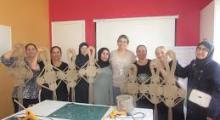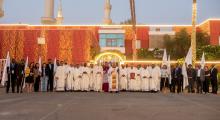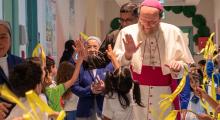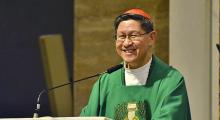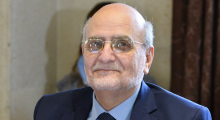Issued by the Catholic Center for Studies and Media - Jordan. Editor-in-chief Fr. Rif'at Bader - موقع أبونا abouna.org
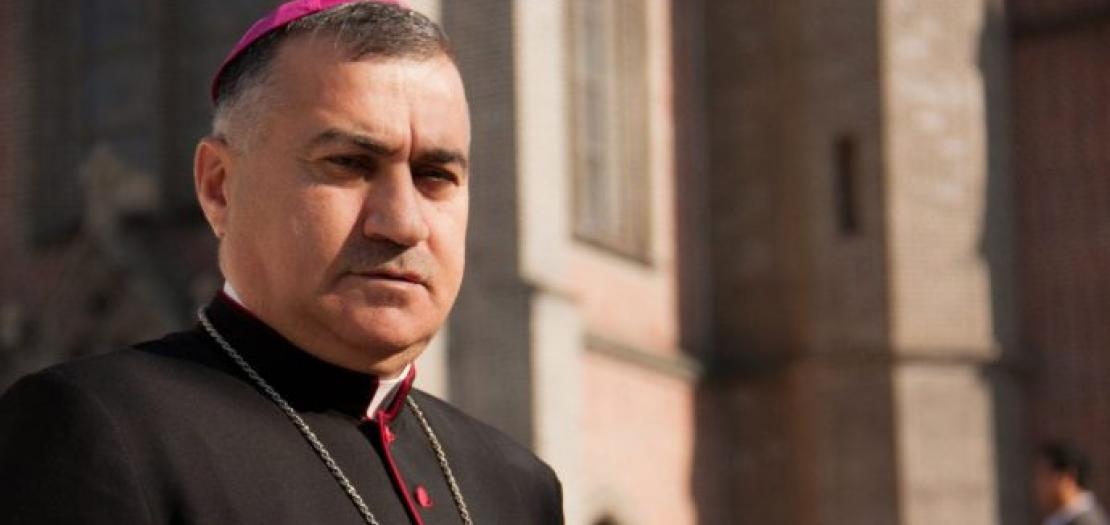
Church leaders in Iraq have praised Pope Francis’s decision to come in March amid a pandemic as a brave decision, voicing hope that his presence in the country will send a much-needed message of peace and solidarity, and will encourage Christians to stay, despite present difficulties.
Speaking of Pope Francis’s coming visit to Iraq in March, Archbishop Bashar Warda, Chaldean archbishop of Erbil, said he believes “it’s a very courageous decision and step that he’s taking.”
Noting that the world is still very much at the mercy of COVID-19, Warda said “it’s not something new” for the pope to break or bend protocol, such as taking an international trip in the middle of a pandemic, when he thinks it’s important.
“I wouldn’t say he doesn’t care about protocol, but sometimes he goes beyond protocols,” he said, adding, “For us, it’s a courageous decision to consider, despite the pandemic, to consider that now it’s time to travel and to travel specifically to Iraq for a first visit.”
On Monday, the Vatican announced the trip, which will be the pope’s first international travel in roughly 15 months. He took a hiatus from travel during the initial outbreak of the pandemic, cancelling trips to Malta, East Timor, Indonesia, and Papua New Guinea, none of which have been rescheduled.
In what is shaping up to be a jam-packed visit, the pope will visit Iraq from March 5-8, stopping in Baghdad, the plain of Ur, Erbil, Mosul, and Qaraqosh.
Pope Francis for over a year has insisted on his desire to visit Iraq. During a June 2019 meeting with Catholic aid agencies, he said he planned to go in 2020, saying, “I think constantly of Iraq – where I want to go next year – in the hope that it can face the future through the peaceful and shared pursuit of the common good on the part of all elements of society, including the religious, and not fall back into hostilities sparked by the simmering conflicts of the regional powers.”
It seemed the visit was drawing near when Iraq’s President, Barham Salih, met with the pope at the Vatican in January. However, complications from the coronavirus soon made travel impossible.
The fact that Francis has decided to put the trip on his schedule before there is clarity over whether a collection of COVID-19 vaccines rolling out will be effective shows not only the importance of the visit – which the Vatican insists will “take into consideration” the pandemic – but it also fulfills a long-held dream of his predecessors.
Both John Paul II and Benedict XVI wanted to visit Iraq but were unable to. John Paul II had planned to visit the country in 1999, but that trip never happened because Iraq’s president at the time, Saddam Hussein, postponed it and it was never put back on the schedule.
According to Warda, there is great excitement in Iraq for the pope’s visit not just among the country’s small Christian minority, but also among Muslims and other ethnic groups.
“The pope is really a much loved figure around the world, and especially Muslims have a lot of respect for him. It means a lot to him that His Holiness is taking care of Iraq and thinking about them,” Warda said.
Noting that Pope Francis has repeatedly issued prayer requests for peace in Iraq and for the general Iraqi population since ISIS unleashed its assault in the Nineveh Plain in northern Iraq, Warda said these pleas from the pope “echoed positively here, and they were always heard by so many people.”
“The sense that we’ve gotten from the government, from the politicians, from the media – ever since it was announced it was done so with great respect and great joy. You could tell that the people of Iraq were really waiting for this,” he said, “because since 2003, (there has been) war and violence and ISIS, and even lots of violence has been on the street.”
Given this backdrop, a visit from someone like the pope “means a lot to them,” Warda said, recalling the passage in the biblical book of Genesis where Abraham – whose birthplace was in Iraq – is surprised when travelers show up at his door, and he welcomes them.
“It’s our time to show, and I’m sure we will, show hospitality and to really admire and tell him thank you for coming,” Warda said.
Francis’s visit, which will likely promote a generic message of peace applicable to all religions and ethnicities in Iraq, will widely be seen as an act of support and encouragement for the country’s Christians, who have suffered immense persecution in recent years.
As of 2003, there were roughly 1.4 million Christians in Iraq, however, after years of war and the rise of the so-called Islamic State--which unleashed a bloody campaign either killing Christians, or forcing them to convert to Islam or flee their cities on pain of death--the number has dwindled to just 300,00-400,000.
While numerous efforts are being made to rebuild the villages destroyed by ISIS during its 2014-2017 strongholds in northern Iraq, thousands have already left, and many more are considering it amid a widespread economic crisis and deep-seeded corruption.
With thousands still displaced or living in refugee camps, hopes of moving forward have further dimmed as the coronavirus pandemic has brought rebuilding efforts to a halt.
Speaking to Vatican News, Chaldean Patriarch Luis Sako said he believes the pope’s visit will send a message of solidarity reminiscent of his recent encyclical on human fraternity, Fratelli Tutti.
This message, he said, “has meaning not only for Christians but also for all people in these countries: enough war, enough conflict, enough death, destruction and corruption. We need to build trust, peace and stability, and also human solidarity.”
“For us, we are tired,” he said. “We as Christians in Iraq, in Syria, in Lebanon, and in all of the Middle East, we do not have a way to defend ourselves other than prayer and hope. The only thing that gives us strength is our faith.”
Noting that Christians in Iraq have suffered continually over the past 20 years, Sako said he believes Pope Francis will “bring a prophetic word to lift everyone’s spirit and to open the eyes of Iraqi citizens, but also in neighboring countries, he will bring a new horizon of brotherhood, of respect, and of harmonious coexistence.”
Similarly, Warda reflected on the events of recent years and the large exodus of Christians from Iraq, which has prompted concern among many that if the current trend continues, Christianity will disappear from the region altogether.
Whether people leave or not “is a personal decision,” he said, “but when the pope himself comes and thanks, and stays and prays with us, it means a lot and should mean a lot that he is also paying respect… to our Christian history.”
Now that the pope is visiting, “I’m sure people next time will think twice before leaving,” he said.


